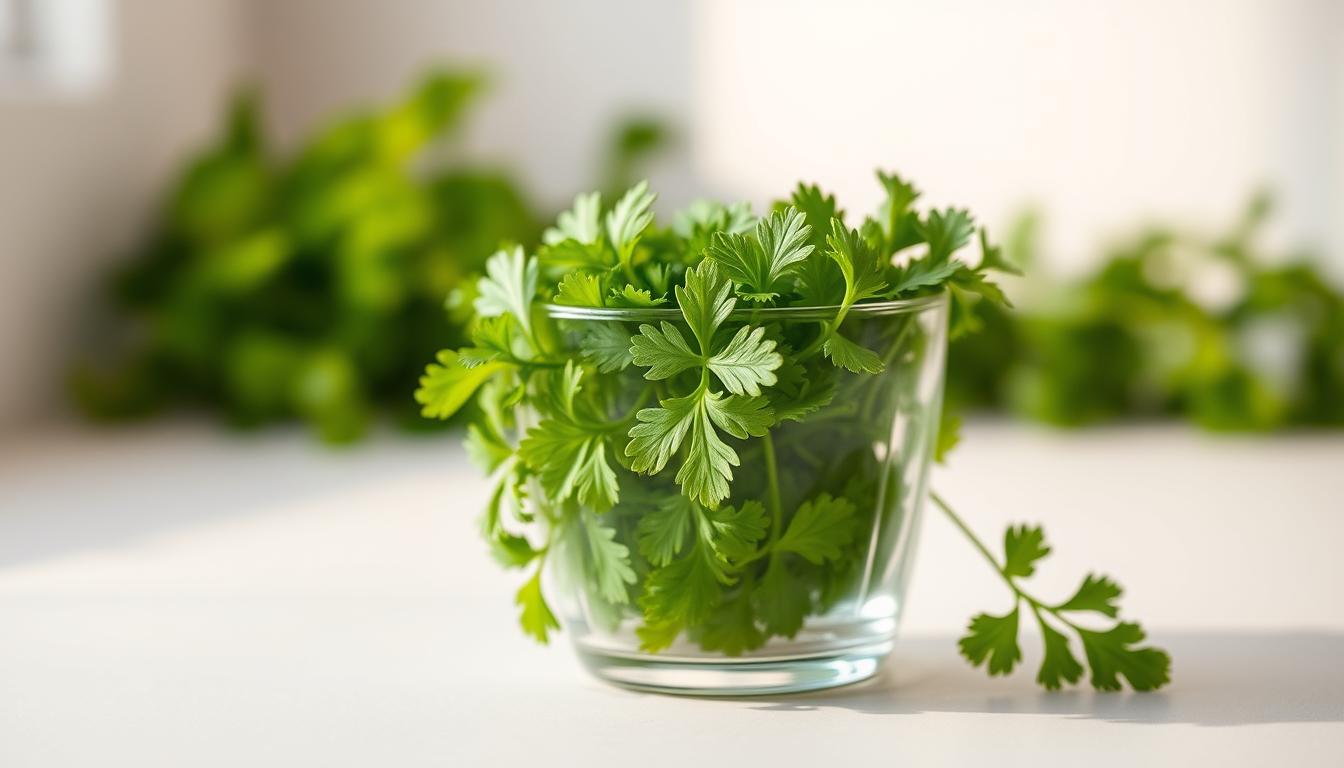Can a simple herb like parsley really help your kidneys? With about 10% of the world’s population dealing with chronic kidney disease, finding support is key. Parsley, used in traditional medicine, has many health benefits, especially for the kidneys. Its bioactive compounds make it a strong ally for kidney health.
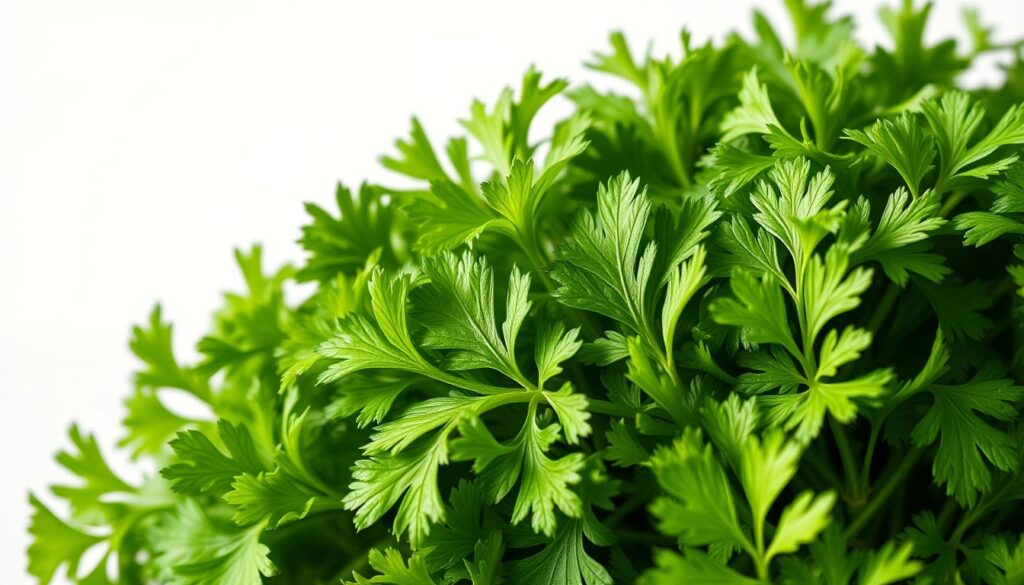
Adding parsley to your diet might seem like a small step, but it’s big for your kidneys. It helps remove toxins and waste, reducing stress and inflammation that harm kidneys. With its ability to increase urine production and act as an antioxidant, parsley is great for kidney health. Learning about boiled parsley’s benefits can help you support your kidneys.
Key Takeaways
- Parsley has been used in traditional medicine for its diverse health benefits, including kidney health.
- Boiled parsley can help stimulate urine production, aiding in the removal of toxins and waste products.
- Parsley’s antioxidant properties can reduce oxidative stress and inflammation, contributing to kidney damage.
- The health benefits of parsley make it an excellent addition to your kidney health regimen.
- Parsley can help reduce excess urinary calcium excretion and lower inflammatory markers.
- Parsley extract has been shown to improve renal biomarkers and mitigate oxidative stress and inflammation.
- Kidney health can be supported by incorporating parsley into your diet, due to its bioactive compounds and diuretic properties.
Understanding the Power of Parsley for Kidney Health
Parsley is packed with nutrients and bioactive compounds. It has flavonoids, essential oils, vitamins, and minerals. These work together to give parsley its health benefits, like being a diuretic and antioxidant.
Parsley is great for kidney health because of its chemical composition. It has lots of flavonoids, essential oils, vitamins, and minerals. These help lower calcium and protein in urine, which is good for kidney health. Also, parsley helps you pee more, which can prevent kidney stones.
Parsley has been used for traditional uses for a long time. Ancient Greeks and Romans used it for urinary tract infections and kidney stones. Knowing about parsley’s chemical composition and traditional uses shows its benefits for kidney health. Some benefits include:
- Reducing urinary calcium and protein excretion
- Promoting urination to lower the risk of kidney stone formation
- Providing antioxidant effects to reduce the risk of heart disease and improve overall health
Eating parsley can help your kidney health. It’s full of nutrients and has a long history of use. Adding parsley to your diet is a natural and healthy choice.
Scientific Evidence Behind Parsley’s Kidney Benefits
Looking into parsley’s benefits for your kidneys is key. Recent studies show parsley extract boosts urine output in animals. It does this by lowering Na+/K + -ATPase activity in the kidneys. This could mean parsley helps your kidneys work better.
Parsley’s kidney benefits also come from its antioxidants and anti-inflammatory compounds. It has flavonoids like apigenin. These boost antioxidant enzymes like SOD and CAT. These enzymes protect the kidneys from damage and inflammation.
Some important findings on parsley’s kidney benefits are:
- It lowers serum uric acid levels and improves kidney health in rats with high uric acid.
- It has strong anti-inflammatory effects, reducing TNF-α and IL-1β levels.
- It increases urine flow and the excretion of sodium and potassium, lowering blood pressure.
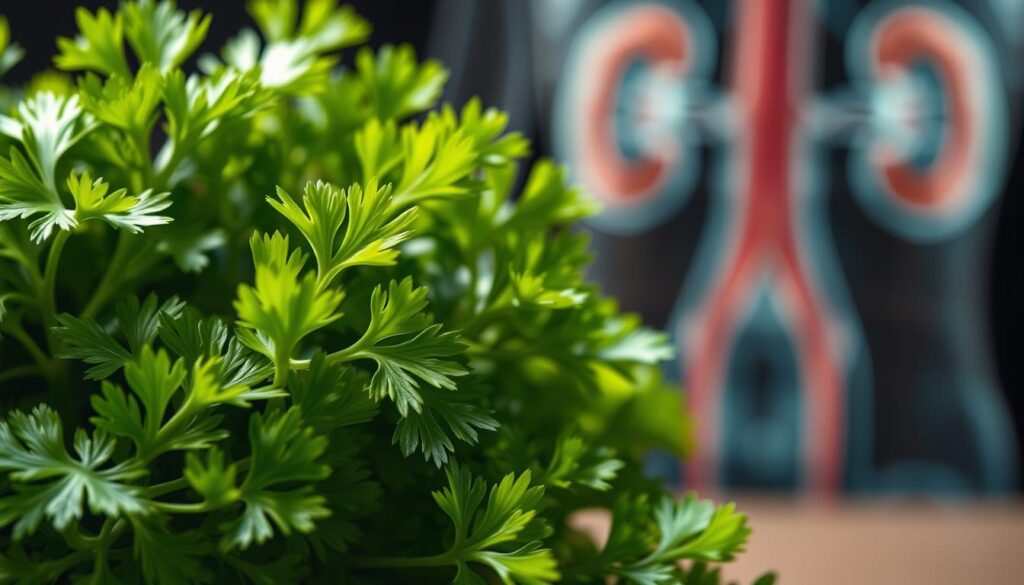
While more research is needed, the current scientific evidence is promising. Parsley could be a great addition to a diet good for your kidneys. Always talk to a healthcare professional before making changes to your diet for kidney health.
How to Select the Best Parsley for Kidney Health
Choosing the right parsley for kidney health is important. You can pick from fresh or dried parsley, grown at home or bought from a store. Fresh parsley is better because it’s more potent and tastes better. Flat-leaf parsley is often seen as more potent than curly parsley.
It’s also key to decide between organic or conventional parsley. Organic parsley is grown without harmful chemicals. This makes it a good choice for those who want a natural product. Whether you pick fresh, dried, or both, you’ll get a herb rich in nutrients that supports kidney health.

Some important things to think about when picking parsley for kidney health include:
- Choose fresh parsley for its higher potency and better flavor
- Consider flat-leaf parsley for its potential health benefits
- Opt for organic parsley to avoid exposure to pesticides and other chemicals
- Grow your own parsley at home for complete control over the growing conditions
By considering these points and picking the right parsley, you can support kidney health and overall well-being. Parsley is full of nutrients and has health benefits. Using fresh, dried, or both, you’ll get a herb that’s good for your kidneys.
The Perfect Method for Boiling Parsley
To get the most health benefits from parsley, like supporting kidney health, boiling parsley is a good choice. Just add 1 teaspoon of dried parsley to 250 mL of boiling water. Then, cover it and let it soak for 10 minutes. This releases the flavonoids and compounds that make parsley healthy.
This method makes a soothing parsley tea that you can drink up to three times a day. The secret to perfect parsley tea is in the steeping time and how much parsley you use. Here’s a simple guide to get you started:
- Use 1 teaspoon of dried parsley per 250 mL of boiling water.
- Steep for 10 minutes to release the full flavor and nutritional benefits.
- Strain and enjoy as a hot or cold tea, sweetened with a natural sweetener if desired.
Remember, boiling parsley is just the first step to using parsley for kidney health and wellness. With its rich nutrients and health benefits, parsley tea is a great addition to a healthy diet and lifestyle.
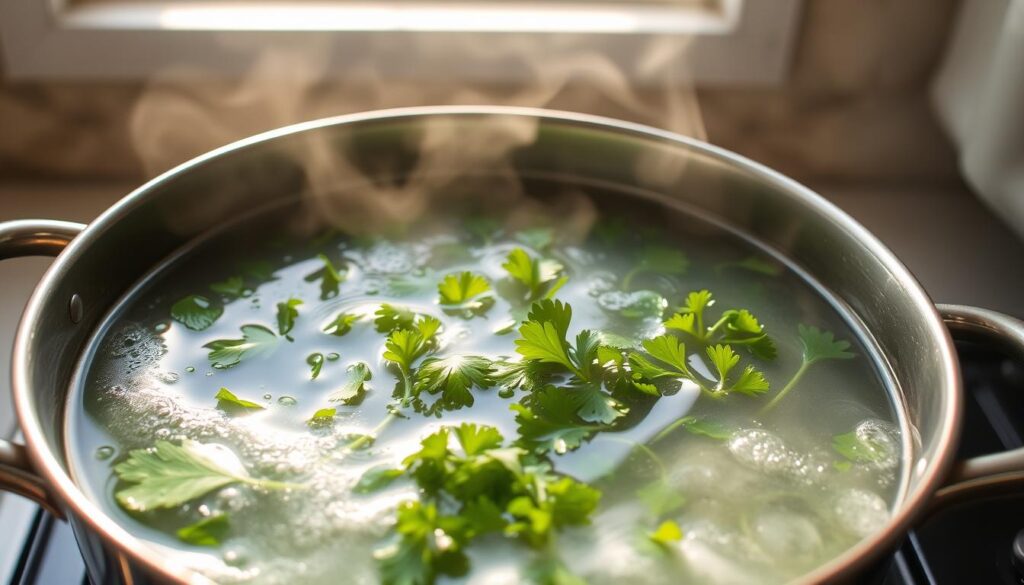
By following these simple steps, you can use parsley to support your kidney health and overall well-being. Whether you’re trying to prevent kidney stones or just want a nutritious and tasty tea, boiling parsley is a good start.
| Parsley Tea Preparation | Amount of Parsley | Steeping Time |
|---|---|---|
| Fresh Parsley Leaf Tea | ¼ cup (60 ml) | 5-10 minutes |
| Dried Parsley Leaf Tea | 2 teaspoons (10 ml) | 5-10 minutes |
| Parsley Root Tea | 1-2 tablespoons (15-30 ml) | 10 minutes |
| Parsley Seed Tea | 2 teaspoons (10 ml) | 5 minutes |
Optimal Dosage and Timing for Kidney Support
Using parsley for kidney support requires knowing the right amount and when to take it. The parsley dosage depends on how severe your kidney disease is and your overall health. Drinking 1-2 cups of parsley tea a day is safe and helps support your kidneys.
The best times to drink parsley tea are in the morning and afternoon. This helps your body make more urine and keeps your kidneys working well. But, don’t drink too much parsley tea, as it can cause problems.
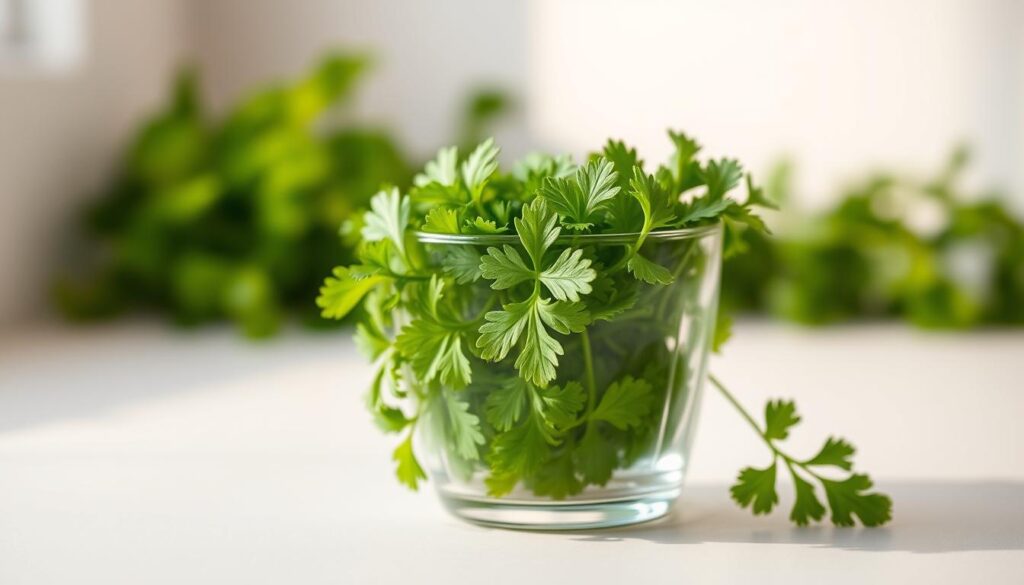
- Start with a small amount and slowly increase it if needed
- Drink parsley tea at the same time every day
- Watch how your kidneys are doing and adjust the amount you drink
By following these steps and thinking about your own needs, parsley can help your kidneys and improve your health.
Additional Health Benefits of Boiled Parsley
Parsley is not just good for your kidneys. It also has many other health benefits. It has antimicrobial activity, which helps fight infections and keeps your gut healthy.
Boiled parsley is also anti-inflammatory and antioxidant. These properties help reduce inflammation and protect cells. It’s great for your digestive health, can lower fever, and fight respiratory infections.
Some of the key benefits of parsley include:
- Rich in vitamins A, C, and K
- High in minerals like calcium, iron, and potassium
- Antioxidant and anti-inflammatory properties
- Supports digestive health and reduces bloating
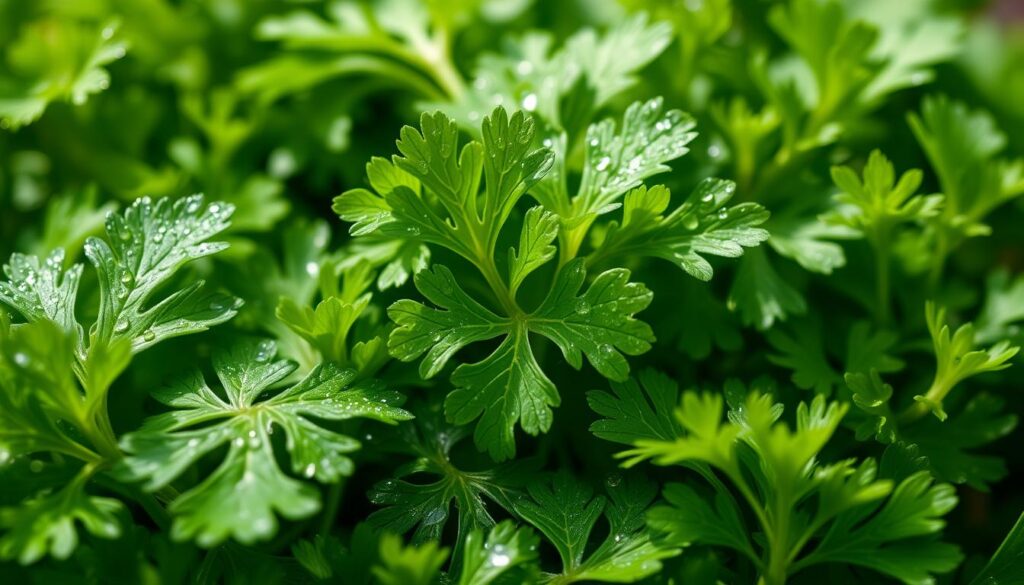
Parsley may also help fight cancer cells. Parsley tea is full of vitamins and minerals. It’s a great addition to a healthy diet because of its antioxidants.
Potential Side Effects and Precautions
Thinking about adding parsley to your diet for kidney health? It’s key to know the possible side effects and precautions. Parsley is usually safe, but it can affect certain medicines and health issues. For example, it might change how blood thinners and diabetes meds work. Always talk to a doctor before eating parsley, especially if you’re on meds or have health problems.
Some people might be allergic to parsley, causing skin issues or more serious reactions. Eating too much parsley can also cause dehydration, anemia, or problems with the liver or kidneys. Pregnant women should limit parsley because it might cause uterine contractions or harm the fetus.
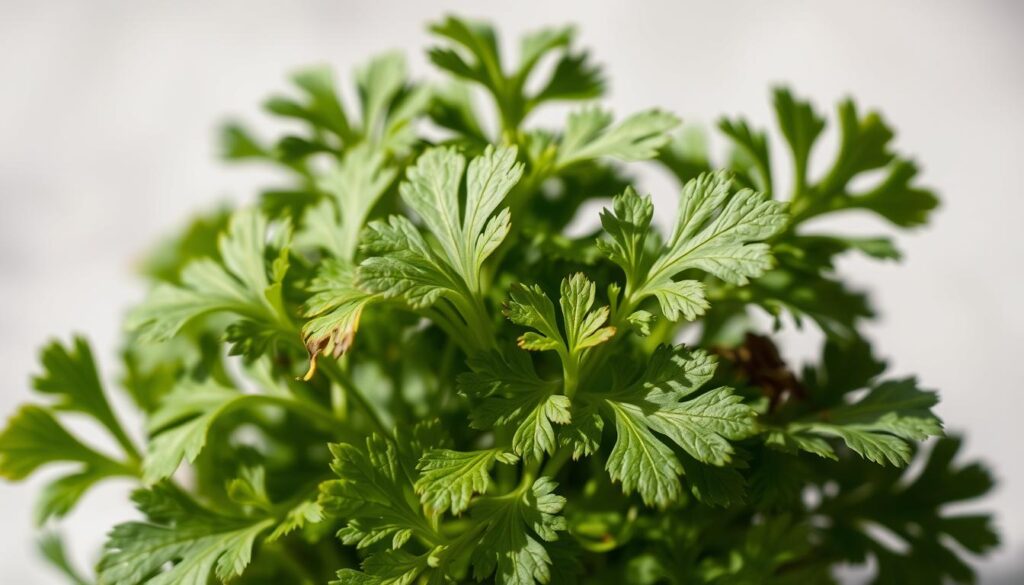
- Always talk to a doctor before eating parsley, especially if you have health issues or take meds.
- Start with a small amount and watch how your body reacts.
- Don’t eat too much parsley to avoid bad effects.
By knowing these side effects and precautions, you can enjoy parsley’s benefits safely. Always put your health first and talk to a doctor if you’re worried.
Incorporating Boiled Parsley into Your Daily Routine
To get the most from parsley’s health perks, add it to your daily routine. You can mix parsley into many recipes, like salads, soups, and sauces. Or, try parsley tea by steeping fresh leaves in boiling water.
Here are some ways to add boiled parsley to your daily life:
- Add parsley to your favorite salad recipes for a fresh and healthy twist
- Use parsley as a garnish for soups and sauces
- Drink parsley tea 2-3 times a week to support kidney health
Adding boiled parsley to your daily routine is simple and tasty. Its rich taste and health benefits make it a great meal addition. Try parsley in your favorite recipes today and see the difference.
Storage and Preservation Methods
To keep your parsley fresh, it’s key to store it right. You can keep parsley in the fridge for up to a week. Freezing it for up to six months is also an option. This is great for keeping parsley’s health benefits all year.
For boiled parsley tea, store it in the fridge for up to three days or freeze for two months. Keeping parsley fresh and potent is important. By following these tips, you can enjoy parsley’s benefits all year.
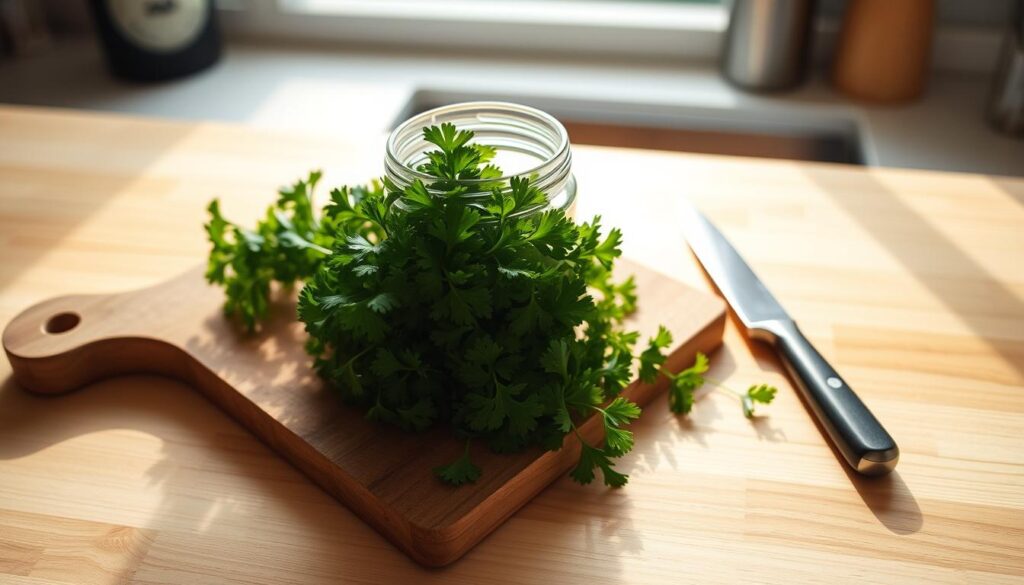
- Keep parsley away from direct sunlight to prevent loss of potency.
- Store parsley in a cool, dry place to prevent mold and spoilage.
- Use airtight containers to store dried or frozen parsley to preserve freshness.
Understanding how to store and preserve parsley is crucial. It helps you enjoy its kidney benefits daily. Whether you store it in the fridge or freeze it, parsley is a versatile herb. It can be used in many ways.
Conclusion: Making Parsley Part of Your Kidney Health Journey
Starting your journey to better kidney health? Adding parsley to your daily routine is a smart move. This herb is full of natural goodness that can help your kidneys and overall health. You can enjoy it as tea, add it to meals, or use it as a garnish.
Regularly eating parsley can help your kidneys work better. It can also lower the chance of kidney stones and urinary tract infections. Parsley’s mix of antioxidants, diuretics, and anti-inflammatory agents helps keep your body balanced and clean.
Keep working towards better kidney health with a balanced approach. Drink plenty of water, eat well, and include parsley in your diet. This natural herb can be a tasty and important part of your journey.
FAQ
What are the health benefits of boiled parsley for the kidneys?
Boiled parsley is good for the kidneys. It helps make more urine and gets rid of toxins. Its antioxidants also reduce inflammation and damage.
What is the chemical composition of parsley that contributes to its kidney health benefits?
Parsley is full of flavonoids, essential oils, vitamins, and minerals. These work together to help the kidneys. They make parsley a great medicine.
How has parsley been used traditionally for kidney health?
For centuries, parsley has helped with kidney issues. Ancient Greeks and Romans used it for infections and stones. Its long history shows its value for kidney health.
What does the scientific evidence say about parsley’s benefits for kidney health?
Studies show parsley reduces stress and inflammation in the kidneys. It also helps make more urine. This helps remove toxins from the body.
What type of parsley is best for kidney health?
Flat-leaf parsley is better than curly for kidney health. Choose fresh over dried parsley. Organic is best to avoid chemicals.
How should parsley be boiled to maximize its health benefits?
Boil parsley to release its benefits. Add 1 teaspoon of dried parsley to 250 mL boiling water. Let it soak for 10 minutes. This releases the good stuff.
What is the optimal dosage and timing for consuming boiled parsley for kidney support?
The right amount and time depends on your health. Drinking 1-2 cups of parsley tea daily is safe. Morning and afternoon are best times.
What are some potential side effects or precautions to be aware of when consuming boiled parsley?
Parsley can affect blood thinners and diabetes meds. It’s not good for kidney disease or pregnancy. Always talk to a doctor before using parsley.
How can boiled parsley be easily incorporated into a daily routine?
Adding parsley to your day is simple and tasty. Use it in salads, soups, and sauces. Drink it as tea or garnish dishes. Aim for 2-3 times a week for best benefits.
How should parsley be stored to maintain its freshness and medicinal properties?
Keep parsley fresh in the fridge, away from sunlight. It lasts up to a week or six months frozen. Boiled tea can be stored for three days or frozen for two months. Freezing keeps its benefits all year.

